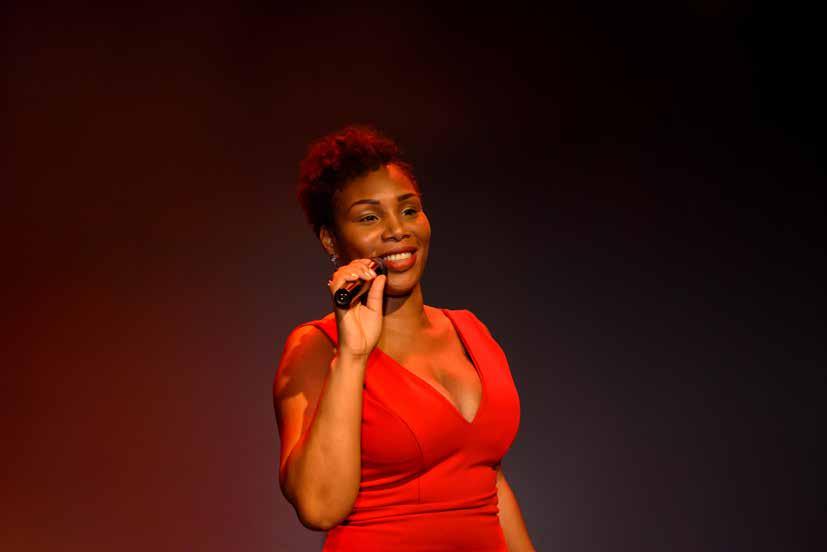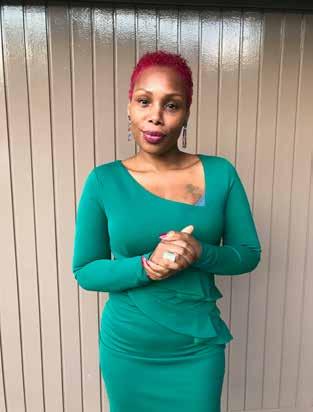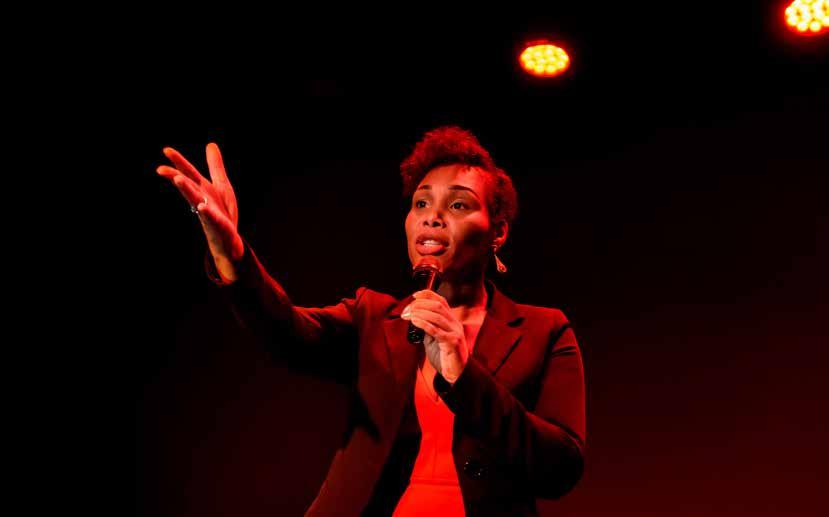
14 minute read
Tribute to Dr. Harold E. Robles: How he wants to be
Tribute to Dr. Harold E. Robles: HOW HE WANTS TO BE REMEMBERED!
In Memoriam dr hc Harold E. Robles October 8, 1948 - July 31, 2020
Advertisement
Harold Robles passed away on July 31, 2020. He was 71 years old. He leaves a big void, but his life’s work - the Health Promoters - will be continued by the board of the Friends of HPSA (Health Promotion South Africa) foundation, including chairman Jisk Nijdam, treasurer Leo Winkelhorst and organizer / coordinator Regina Eggink.
In South African townships, thousands of people die unnecessarily every year from ailments caused by poor hygiene and poor health knowledge. The Health Promoters provide local information about basic matters such as brushing your teeth, washing hands, sanitary hygiene and good nutrition. In this way, the local population gains a lot of practical knowledge. This knowledge leads to a drastic reduction in mortality among children, adolescents and adults.
Harold Robles was a co-founder and driving force of the Health Promoters. Harold was a passionate man, a connector par excellence, convincing and charismatic. He was passionate about the good work being done in South African townships. A man of perseverance, someone you went through fire for.
Numerous well-known Dutch people therefore selflessly joined Harold’s Health Promoters. In 2019 there was a successful golf event, Golf4Health, in Brielle and a fantastic gala evening in Wassenaar. More than twenty celebrities contributed selflessly to these events, such as Koert-Jan de Bruijn, Nelli Cooman, Olga Commandeur, Willem van Hanegem, Nurlaila Karim, Mariska van Kolck, couturier Ronald Kolk, Tom Okker, Lou Prince, Patricia Steur and Klaas Wilting.
For his good humanitarian work, Harold was awarded two honorary degrees from American universities: Doctor of Humane Letters from Albertus Magnus College in New Haven, Connecticut and one in 2010, Doctor of Public Health from American International College in Springfield, Massachussetts. In 2009 he also received a royal decoration, Knight of the Order of Oranje-Nassau.
Several years ago, Harold was diagnosed with prostate cancer. In his characteristic way he went into battle: positive and energetic. He was in good hands at Erasmus MC. All records were pulled to heal Harold.
Although there were occasional positive developments, Harold had to give in a few weeks ago. “The cancer has won,” he said in an emotional phone conversation recently.
He passed away on Friday, July 31, 2020.
Characteristic was his desire to suggest an alternative to flowers at his funeral. “Rather let people spend the money on the work of the Health Promoters,” he said. You can donate via the website: www.healthpromoters.co.za Support the Health Promoters in the Netherlands? Bank : Rabo Bank IBAN : NL 02 RABO 0304815535 BIC Code : RABO NL 2U Account Name: Friends of the Health Promoters Foundation Account No .: 072 260 548ANBI 855194030 Friends of the Health Promoters - p / a Langeweg 34, 3233 LM Oostvoorne
Tel: +31-0181-700241 The contact person is: Regina Eggink-Stolk Coödinator HP Nederland
E-mail: info@healthpromoters.co.za LET US KEEP HIS WORK ALIVE AND WELL. THANK YOU ALL.
Racism would not disappear over night - Lucinda Malbons

Lucinda Malbons, mostly called Luus Malbons is a public speaker and a spoken word artist but she has done much more in her very fruitful and challenging life. Over the years, she has worked as a book sales executive, started her own business, Malbons Enterprise BV which she still runs till date. As a result of her works, women are empowered to seek their greatness and act upon it; she helps women in particular to develop self confidence and improve their communication skills so that people dare to change their mind set. According to her, she is born to speak, trained to write and to leave a footprint behind. She is doing exactly that with her voice, during the commemoration of the Abolition of Slavery in Rotterdam (Keti-Koti), Lucinda Malbons spoke a word. Although born in Suriname but she has lived most of her adult life in Rotterdam and she admits she ancestors were enslaved so she is a descendant of enclaved people. “For me it is true that my father’s grandmother was still an enslaved one. The stories are still close by says Lucinda. She spoke in Sranang and in Dutch. In that first language there is a bit more ‘ancestor feeling’ in it. Lucinda speaks mainly Dutch in daily life. Her message is “We need to remember slavery and that period and in that way we always carry our ancestors with us, in our hearts. After a long time of trying to get her for an interview, we succeeded two months ago and we present you with our chat one Face to Face with Lucinda Malbons, a woman of words in this exclusive interview. Enjoy it.

TV: Introduce yourself to our worldwide readers please and what you do professionally? Lucinda: My name is Lucinda Malbons. I am 46 years young and a blessed mother of three beautiful children. In 2017, I started my own company, Malbons Enterprise BV. I am a professional public speaker on social issues and personal development trainer and also a trainer in personal development and presentation skills. Aside from these things, I am also a Spoken Word Artist. TV: You are originally from Suriname? So how long have you lived in the Netherlands? Lucinda: I was born in Suriname and raised in the Netherlands. I have lived for the most part of my life in The Netherlands, a city called Rotterdam. My mother came with me to Rotterdam when I was only one year old.
TV: What has changed over the years from your youth to now in terms of racial relationship? Lucinda: Growing up I never experienced racial issues. The neighourhood where I grew up and the school environment was rather mixed. But as I got older and started exploring the working field I noticed that there was a difference in what people expected that I could or couldn’t do just because of my background and me being black. It was then that I realized that I had a different start. Colleagues who did exactly the same work as I did where paid more than me while we had the same work experience. I also noticed that the people in charge where mostly white people. It had me wondering so things changed over the years as I grew older. TV: How will you describe the Dutch environment compared to where you were born in Suriname? Lucinda: Comparing the Dutch environment to the Suriname environment is rather difficult for me because I came here at a rather young age. But I travel there on vacations and business trips a couple of times but it’s just not the same as living there. But what I can say from my experience is that Suriname people are much more relaxed when it comes to things as the lifestyle demands. Dutch people always seem to be in a hurry and everything has to be done on schedule. While Suriname people are living more of a less rushed life. Also I feel like we have a higher rating of hospitality. When it comes down to business I experienced that Suriname people judge you on your experience and personality while Dutch people judge you on who you know in the business. To Dutch people it comes down to your network and how you fit in to theirs then you can talk or do business with them. TV: So many discussions on racism here in the Netherlands. Are we making headway in your thoughts? Lucinda: I feel like we are making progress, slowly but there is progress. To me it grows in levels. The fact that we can have a dialogue about racism is a step forward. What I believe to be true is that it is not on the level yet where things will actually change. We still have a government who don’t believe in the impact that racism has on a broader level. Or maybe I should say that it comes rather handy to them to leave things the way they are because institutional racism brings up money. We still don’t have enough black people or people of colour to represent us and who have sufficient authority to apply laws and regulations that would be beneficiary to us. Our economic strength is also not at the same level with them so we still have a long way to go but we are on the journey now. TV: I first got to meet you during an activity of The Voice Achievers Award where you presented your Spoken word. Is

that something you do professionally or just a talent God has given to you? LUCINDA: First and foremost I wish to acknowledge that it is a talent that God has given me. I am a vessel which I put in professionally. It is a beautiful form of expression and a way to bring awareness and empowerment to the world. And to be honest I also gain a lot of energy and happiness from it. TV: How do you get inspiration for the things you write down and speak out in your presentations? Lucinda: My life hasn’t always been easy. I lost my father at a young age and I have not always had the protection of adults in my life. Because I had a lot of personal development to do myself I take my lessons that became my blessings as inspiration. That also wasn’t an easy thing to do. I come from a culture where we don’t discuss certain things so you keep it to yourself and try to figure it out yourself. But how can we grow as humans when we don’t share our journey? There is always someone going through what you’ve been through and needs to hear that there is light at the end of the tunnel. In my presentations I also share my vision and speak my mind about social issues. Not because my way or my thoughts are the only way to view things, but to open up the dialogue and create a space within people to see things from another point of view. Conversation brings transformation therefore I try to use my spoken word to bring about a conversation with people. TV: How often do you perform spoken word and what is the public reception of your performance? Lucinda: Normally I had performances on a regular basis, like almost every weekend. My assignments alternated between spoken word and public speaking. Since Corona it has fallen apart or slow down to put it politely. But I had a few online performances during this time. The most common thing people say about my performances is that they are impressed by the originality of the performance and that it feels as if the spoken word is dedicated to them personally and stirred something within them. To honest this is one of my main objective, to connect the people to the spoken word.

TV: Have you accomplished your purpose with your spoken word? Lucinda: I would say yes and no. Yes because the feedback that I get from my audience is exactly the experience I want to bring them and the transformation in mindset that I want to leave behind. No, because I am still growing in my journey and my goal is to speak internationally and be a vessel to a bigger audience around the world. TV: Do you have contact with the Diaspora African audience in Holland? Lucinda: Yes I do. There are so many entrepreneurs from the

diaspora that I am in contact with on business level. We try to uplift each others businesses by supporting and buying black products and come together to bond so we can grow and establish financial and healthy mindsets. In the past I owned a black bookstore where I sold books written by Africans, AfroSurinameses and Afro-American writers. That also enlarged my network big time. And the memories live on with me till this day. TV: Is there any form of collaboration with you and other Africa Diaspora organizations in Holland? Lucinda: I recently started participating in a talk show ‘Adem’ that is produced by Afro-Dutch Powerhouse where we have a dialogue with a panel on diversity of topics concerning the African Diaspora and the way we view ourselves. It has been very interesting and it is growing. TV: In recent times, there is a lot of shifting of blacks in America and other parts of the Caribbean seeking their traditional roots back to Africa. Is that part of your goal?
Lucinda: I have never visited any of the African countries yet, but I do wish to go. A few weeks back I ordered the DNA kit on ‘My Heritage’. The plan is to wait until I receive the results of the test and my ethnic origins and then I can plan to visit the countries where my DNA leads me to. I don’t see myself living in the Netherlands at my old age. My wish is to live where the sun greets me every morning and where I am surrounded by people who looks like me. TV: What do you expect to see after all the talk about “Black lives matters”? Lucinda: To be honest I really wish for us as black people to unite and come and be and live like one. That we ourselves do not take part in the dividing role that brings us no good. That we will stand up for ourselves and our people but also stop enabling toxic behaviour within our communities. What I expect to see is that black people’s behavior will be put under a magnifying glass in order to justify police brutality. I believe that racism will never be totally put out of our society, it would remain a part because many things are built on this part in our societies so change will come, but it will come slowly. TV: How do you expect from all these discussions? Lucinda: As for the discussions, I see black people getting
tired. They do not want to discuss the obvious anymore. I expect that more white people will stand up and speak out against their own. But black people are kind of done with the talking and will slowly start building their own communities excluding white people. It might even lead to migration back to their motherland or other places where they can live amongst people who look like them. TV: What are your plans for the future? Lucinda: I do not see myself growing old here in the Netherlands as I have mentioned before. Firstly, I am not created for this weather. (She laughs- hahaha). I believe that my purpose is to help people get a clearer mindset on how to live their full potential by doing the inner work. That’s why my focus is on personal development. I believe that when we learn to work on ourselves as individuals we can create a stronger community. A better world starts within ourselves, meaning a healthy mindset on finances, love, health, relationships, education and so on and so forth. TV: What do you expect from the African people both on the continent and in the Diaspora?
Lucinda: I expect both parties to see that we are one. The ones who willingly left, the ones who unwillingly left and the ones who are still on the continent need to join forces and invest their financial capital in to Africa development. If their is no capital base then use the skills God has gifted you by birth or through the knowledge you have gained abroad or on the continent to make Africa better. It is not a one man thing or show, we have to do it collectively and it is possible if the will is there to make it happen. I see some actions towards this

direction already, we have to continue no matter how small it may look now. TV: Lastly what would be your advice to those reading your interview? Lucinda: I would like to encourage everyone reading this interview to look inside yourself and ask yourself what can I do? You are born with gifts and talent and they are not yours to keep. We are all vessels. The world already has a lots of opinions when it comes to racism but what can we actually do? Dear reader, seek within yourself an answer to this question ‘What can I do to make a difference?’ My advice would be: Be the difference! Use your God given talents and live your purpose. TV: Thank you Luus for your time and this great interview. Lucinda: You are welcome, also a pleasure to do this interview with your magazine.











